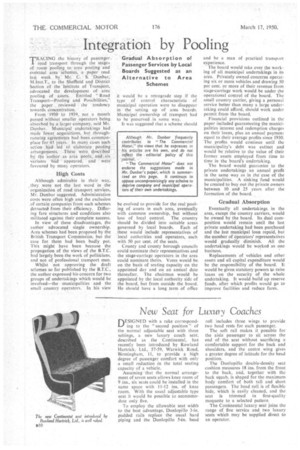Integration by Pooling
Page 44

If you've noticed an error in this article please click here to report it so we can fix it.
Gradual Absorption of Passenger Services by Local Boards Suggested as an Alternative to Area Schemes
'TRACING the history of passenger, 1 road transport through the stages Of route pooling to area pooling and eve'ntnal area schemes, a paper read last week by Mr. C. : S. 'Dunbar, M.Inst.T., to the Sheffield and District Section of the 'Institute of Transport, advocated the development of area
pooling of assets. Entitled Road Transport—Pooling and Possibilities," the paper reviewed . the tendency towards concentration.
From '1930 to 1939, not a month passçdl without smaller operators being absorbed by a larger company, said Mr. Dunbar. Municipal undertakings had made fewer acquisitions. but throughrunning agreements had been cOmmonplace for 45 years. In many cases such actionhad led to elaborate pooling .trrangernents. -These were. described by the "author as area pools and six variants -had appeared, and were favoured by many operators.
High costs
Although admirable in their way, they were not the last word in the organization of road transport services, Mr. Dunbar suggested. Administration costs were often high and the exclusion of certain companies from such schemes detracted from their efficiency. Differing fare structures and conditions also militated against their complete success.
In view of these disadvantages, the author advocated single ownership. Area schemes had been proposed by the British Transport Commission, but the case for them had been badly put. This might have been because the propagation of the views of the B.T.C. had largely been the work of politicians, and not of professional transport men.
Whilst not approving the draft schemes so far published by the B.T.C., the author expressed his concern for two groups of undertakings which would be involved—the municipalities and the small country operators. In his view
be evolved to provide for the real pooling of assets in each area, eventually with common ownership, but without loss of focal control. The country should be divided into suitable areas governed by local boards. Each of these would include representatives of local authorities and operators, each with 50 per cent. of the seats.
County and county borough councils could nominate their representatives and the stage-carriage operators in the area could nominate theirs. Votes would be on the basis of seating capacity on the appointed day and on an annual date thereafter. The chairman would be appointed by the local authority side of the board, but from outside the board. He should have a long term of office and he a man of practical transport eZperience. The board would take over the working of all municipal undertakings in its area. Privately owned concerns operating Mk or more vehicles and drawing 50 per cent, or more of their revenue from stage-carriage work would be under the operational control of the board. The small country carrier, giving a personal service better than many a large undertaking could afford, should work under permit from the board.
Financial provisions outlined in the paper included guaranteeing the municipalities interest and redemption charges on their loans, plus an annual payment equal to their average profits since 1930. The profits would continue until the municipality's debt was extinct and would be relative to the value of their former assets employed from time to time in the board's undertaking.
The board would guarantee to the private undertakings an annual profit in the same way as in the case of the municipalities. A sinking fund would be created to buy out the private owners between 10 and 25 years after the formation of the board.
Gradual Absorption
Eventually all undertakings in the area, except the country carriers, would be owned by the board. Its dual composition would remain until the last private undertaking had been purchased and the last municipal loan repaid, but the number of operators' representatives would gradually diminish. All the undertakings would be worked as one business.
Replacements of vehicles and other assets and all capital expenditure would be the responsibility of the board. It would be given statutory powers W raise loans on the security of the whole undertaking. It would build up reserve funds, after which profits would go to improve facilities and reduce fares.




























































































